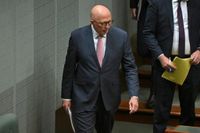In a pivotal moment for Australia’s energy policy, Opposition Leader Peter Dutton has confirmed that the gas export industry is significantly harming Australian consumers. During his budget reply speech, Dutton outlined a plan that would require gas exporters to divert uncontracted gas to local customers, a move that he argues is essential to address the ongoing energy crisis.
According to research from the Australia Institute, excessive gas exports have led to a dramatic tripling of domestic gas and electricity prices. Dutton’s proposal aims to reverse this alarming trend by limiting exports, a solution that he insists is necessary to ensure affordable energy for Australians.
“It is good to see the Opposition identify the key problem in Australian energy policy – excessive gas exports,” said Mark Ogge, Principal Advisor at The Australia Institute. He emphasized that the only way to combat the rising costs is to restrict exports and transition Australia’s energy demand to cleaner sources.
Gas exporters, including major player Santos, have previously acknowledged that part of their strategy for export gas projects was to increase domestic gas prices. This admission has raised eyebrows and concerns among consumers and industry leaders alike. Dutton’s plan seeks to address these issues head-on, indicating that the current gas market is not functioning in the best interest of Australians.
Furthermore, the gas industry has been criticized for its low tax contributions and minimal employment impact. The Australia Institute has pointed out that no gas exporter has ever paid the Petroleum Resources Rent Tax, which has been in effect for nearly 40 years. This lack of financial accountability raises questions about the sustainability of the gas export model and its implications for the Australian economy.
“Gas exports have tripled prices for Australians and the only way to stop that is to restrict exports,” Ogge added, highlighting the urgent need for policy reform. He pointed out that 80 percent of Australia’s gas is exported, with over half of that being provided royalty-free to multinational corporations. This situation, he argues, has created an imbalance that must be addressed.
In response to Dutton’s proposal, major east coast gas users have expressed their support, viewing it as a crucial step towards revitalizing domestic manufacturing. Manufacturing Australia, an industry group representing companies such as BlueScope and CSR, has endorsed the initiative, stating that it is vital for reducing gas prices from over A$14 per gigajoule to below A$10.
“These are necessary and welcome measures. Our message is clear: If we want Australian manufacturing jobs, we need competitively priced gas,” said Ben Eade, Chief Executive of Manufacturing Australia. He emphasized that gas prices above A$10 per gigajoule are untenable for a gas-rich country like Australia, urging the government to take decisive action.
In 2024, approximately 87 petajoules of uncontracted gas were exported to global spot markets, a practice that Eade argues should be redirected to domestic users, especially as regulators forecast potential gas shortages. The current export strategy, he claims, is detrimental to local manufacturers who are grappling with high gas prices and supply uncertainties.
Earlier this month, Manufacturing Australia outlined a four-point plan aimed at accelerating domestic gas development while ensuring environmental safeguards are in place. This plan also includes a proposal for a national gas reservation policy, modeled after Western Australia’s successful framework, which reserves 15 percent of gas exports for local consumers.
The growing consensus among industry leaders and political figures suggests a shift in Australia’s approach to gas exports. Dutton’s call for reform reflects a broader recognition of the need to prioritize domestic energy needs over international profits. As the debate continues, the focus remains on finding solutions that balance economic growth with the well-being of Australian consumers.
In conclusion, the dialogue surrounding gas exports in Australia is evolving, with significant implications for both consumers and the manufacturing sector. As the government considers Dutton’s proposals, the outcome could redefine the landscape of Australia’s energy policy, potentially leading to more sustainable practices that benefit local communities.





